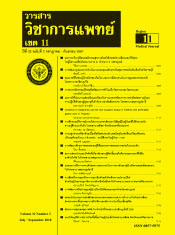Cognitive Stimulation with Mild Cognitive Impairment in People
Keywords:
Lognitire status, cognitiow stimulation, mild cognitive impairment, dementionAbstract
This quasi-experimental design study aimed to investigate the effect of cognitive stimulation with mild cognitive impairment in people. The sample consisted of 30 people aged over 50 years who lived in Mueang District, Surat Thani Province, and met the inclusion criteria. Simple random sampling technique was used to draw the control group and the experimental group from the sub-districts. Both groups had similar characteristics of gender, age, education level, and cognitive score. The experimental group received the cognitive stimulation program. Data collection was conducted using cognitive assessment. Data analysis was done using descriptive statistics and repeated measures ANOVA.The results showed that, at the 3-month post-intervention and the 6 and 9-month follow-up, the experimental group had a higher cognitive score than prior to the intervention and had a higher mean score of cognitive status than the control group. In the control group, the mean score of cognitive status increased at the 3-month post-intervention but decreased at the 6 and 9-month follow-up. The experimental group had different scores of cognitive status pre- and post-intervention at the 3, 6 and 9-month follow-up with statistical significance (p<.05). The control group had different scores of cognitive status with no statistical significance (p>.05).The cognitive stimulation program with mild cognitive
impairment can be implemented on adults and older adults to reduce the risk of future dementia
Downloads
Published
How to Cite
Issue
Section
License
Copyright (c) 2018 region 11 medical journal

This work is licensed under a Creative Commons Attribution-NonCommercial-NoDerivatives 4.0 International License.






